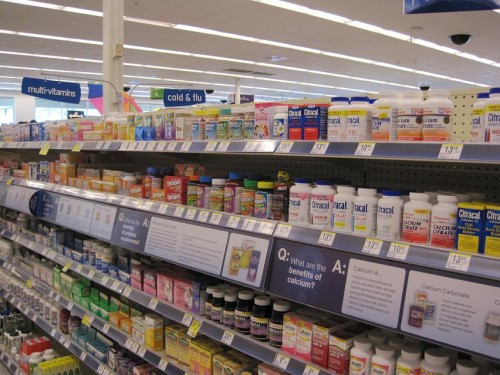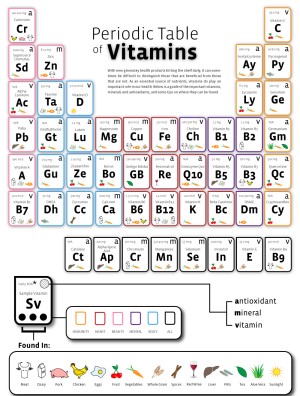
When you go to a store or online to shop for a multivitamin how do you go about making your choice? Do you feel 100% confident in your purchasing process? Do you rely on better informed friends and family, buy on a whim if the advertising looks reputable enough or do you simply guess your way through it? According to a study done by the Office of Dietary Supplements, in 2009 Americans spent $11.3 billion dollars on some kind of vitamin/mineral supplement and yet there are no standard or regulatory definitions available for multivitamins that tells us what nutrients it should have and at what levels. That means the company gets to decide what goes into it for better or perhaps worse. Here you’ll find some guidelines to help you decipher the ingredient list on a multivitamin/mineral (MVM) label, how to tell if it’s a good quality vegan product and ways to discover if you’re deficient.

Bioavailability, Chelation and Pre-methylated: Will the ingredients in the MVM actually be absorbed and used by your body? In order for a supplement to get from your digestive track, into your bloodstream and ultimately to the location where your body can use them it must go through an extensive and complex set of steps. Depending on the quality of the product you’re taking, your body will either have an easy time of it or a difficult (if not impossible) one. Now please stick with me here so we can go over some rather technical but important terms! Bioavailability is the degree to which a nutrient is available to the body for use (this is true regarding everything you ingest by the way). For starters it has to be able to dissolve fast and disintegrate fast (referring to how quickly a capsule or tablet can break down into smaller pieces). Chelation is also very important when it comes to making sure that the minerals in your supplement are bioavailable, which is not easy always easy. Chelation involves wrapping the mineral in a an amino acid so that the body can more easily absorb it and can improve the absorption rate of some minerals from 10 % absorption for a non-chelated mineral to 45% and more for a chelated one. And lastly is whether or not a nutrient is “pre-methylated”, meaning that the nutrient is already in a form the body recognizes. Non-methylated is the chemical or synthetic form of the nutrient in question and requires your body to convert it to a usable form.
A Vitamin Is Sold In Many Forms and Price Points: Does that matter?
 Yes. For Vitamins to be effective, it is essential that it come in a form that is recognized and utilized by the body. Many MVM’s are formed using synthetic and inferior ingredients, which the body does not recognize. Also, if an MVM is very cheap, then let that be your first red flag. Companies that sell low-cost vitamins can do this because they’re using non-methylated nutrients as well as fillers, binding agents, additives, preservatives and sweeteners that have absolutely no value to your body whatsoever. In fact, there’s a good chance your body won’t even use much of it.
Yes. For Vitamins to be effective, it is essential that it come in a form that is recognized and utilized by the body. Many MVM’s are formed using synthetic and inferior ingredients, which the body does not recognize. Also, if an MVM is very cheap, then let that be your first red flag. Companies that sell low-cost vitamins can do this because they’re using non-methylated nutrients as well as fillers, binding agents, additives, preservatives and sweeteners that have absolutely no value to your body whatsoever. In fact, there’s a good chance your body won’t even use much of it.
You Might Not Have Scurvy, But Are You Subclinically Deficient?
Vitamin and mineral deficiencies don’t always show up as major health problems, mainly because Americans don’t tend to be deficient in a single nutrient. As a nation we have progressed enough to know how to prevent most major deficiencies and the health crisis that inevitably follows it. However, according to Dr. Jenny Tylee what is more likely these days is for an individual to have marginal or subclinical deficiencies which cause comparatively minor but not altogether insignificant symptoms such as headaches, difficulty sleeping or skin problems. And of course, if left untreated can become more serious. One of her more recent articles listed some good questions which might help reveal a marginal deficiency and the corresponding nutrients that could be helpful in correcting it.
- Are you tired all the time?
- Is your ability to keep going noticeably decreasing? (Zinc, Iron, Vitamins A,B,C,D)
- Are you having a hard time keeping your weight stable?
- Do you often experience physical pain-arthritis, muscle aches, migraines? (Vitamins B1, D, Biotin, Sodium, Magnesium, Calcium)
- Do you often get colds? (Vitamins A, B-complex, C, Biotin, Calcium, Potassium, Zinc)
- Is your eyesight deteriorating? (Vitamins A, C)
- Is your mental clarity or concentration decreasing?
- Is your memory on the decline?
- Are you experiencing more sleeping problems?
- Are you often depressed? Are you often anxious, nervous, irritable? (Vitamins B6, B12, B3, B5, C, Magnesium)
- Do you have difficulty with your bowels either constipation or diarrhea? (Vitamins B-complex, C…Vitamins A, B3,B12, K)
- Is your skin dry and scaly? Do you have problems with pimples and blackheads? (Vitamins A, B-complex, Biotin, Copper)
How Can You Be Assured That It’s Vegan?
In general MVM’s are the most difficult to ensure that no animal product is used because there are approximately 30 components where sources of processing could involve the use of animal products. For instance, Vitamin D3 (Cholecalciferol) is the most common form of Vitamin D in supplement form and yet is comes from either fish liver oil or sheep’s wool. Animal products are oftentimes used in the coating of Beta-carotene and/or Vitamin A to stabilize the product. I’m pleased to report that Happy Cow already has an excellent resource to help you decipher hidden animal sources tucked deeply in ingredients lists and even have a downloadable pocket guide. You’ll find the link below with a quick recap:
- If it’s really cheap, don’t buy it.
- Choose powder or capsule forms.
- When looking at the Supplement Facts label look for methylated, coenzyme and chelated forms(ie. Zinc as Zinc Amino Acid Chelate OR B12 as methylcobalamin NOT cyanobalamin)
- Don’t rely on an MVM to get all the nutrients you need on a daily basis. MVM’s should supplement and support a healthy, nutrient-rich diet.
- For a list of hidden animal-based ingredients go to https://www.happycow.net/health-animal-ingredients.html
- If you think you might be marginally deficient then assess your diet, start taking a good quality MVM and/or see a reputable health practitioner. Remember, the goal is optimal health, not just disease prevention. Make sure that your nutrition choices are supporting your body’s ability to reach and stay operating at its fullest potential!
by Melissa Sanborn of Nutritional Brands, PureVegan
Resource List
- Multivitamin/mineral supplements: A Professional Facts Sheet. Office of Dietary Supplements at the National Institute of Health. http://ods.od.nih.gov/factsheets/MVMS-HealthProfessional/
- How To Choose A Good Quality Vitamin Supplement For You And Your Family Without Getting Ripped Off. http://www.ajpip.com/vitamin_supplements/res/art.htm
- How You Can Tell If You Have a Vitamin Deficiency by Dr. Jenny Tylee. Ezine Articles. http://ezinearticles.com/?How-You-Can-Tell-If-You-Have-a-Vitamin-Deficiency&id=814
- How Do You Tell If Your Vitamins Are Good Quality by Dr. Stacey Robinson. http://robinsonfamilymedicine.com/blog/?p=421
- Beyond junk vitamins: Secrets the public isn’t supposed to know about the vitamin industry-An interview with Greg Kunin. http://www.naturalnews.com/rr-bioidenticalvitamins.html.






2 Comments
Chia (324 comments)
May 25, 2012 at 1:12 pmThanks for sharing this informative article on vitamins/supplements.
I feel overwhelmed by all the different choices offered at the health food market isles.
Now I take a couple different ones and am happy to learn more!
The Veggie Cook (42 comments)
June 7, 2012 at 11:09 amGood to know. This blog + vitamins table you posted is getting lots of comments on HappyCow facebook.